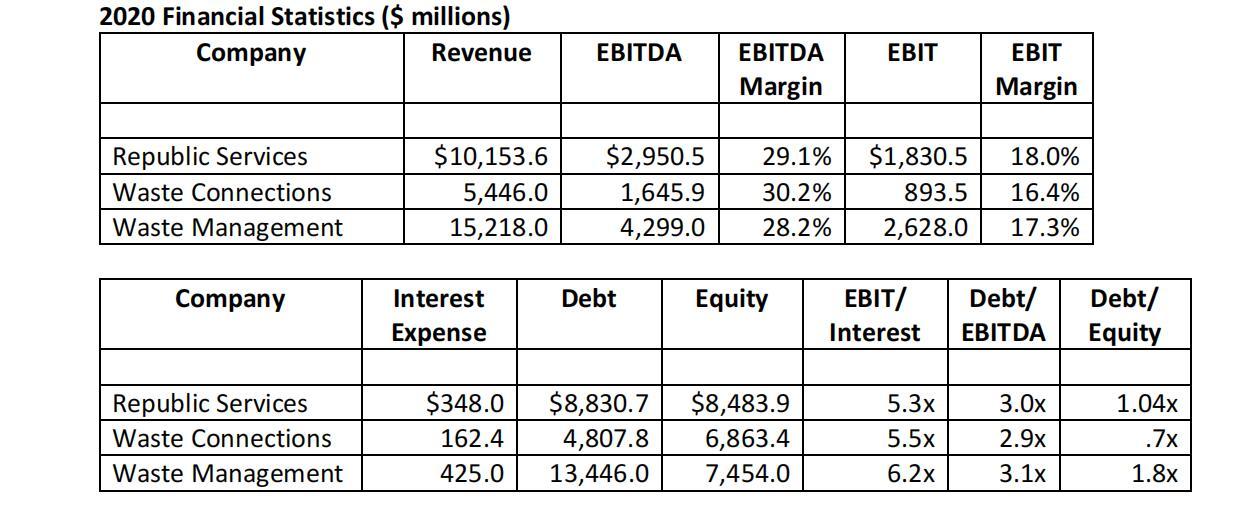Question
Question: 1.Do you think the lender would have any concerns with WCC keeping the same dividend payout ratio after the acquisition? Provide an explanation. 2.Based
Question:
1.Do you think the lender would have any concerns with WCC keeping the same dividend payout ratio after the acquisition? Provide an explanation.
2.Based on 2021, explain if WCC is more or less leveraged, than the competitors.
3.Management has indicated that a multiple of 10x EBITDA is reasonable to value the invested capital of WCC. Explain if and why shareholder value has been created or
reduced from the acquisition when comparing the 2020 value per share to the 2021 value per share.
Case:
Company
Waste Control Concepts Corporation (WCC) is a regional waste management and
environmental services company serving Pennsylvania and New Jersey. Customers include
residential, commercial, industrial, and municipal accounts. WCCs market niche is small and
medium sized businesses and municipalities. Services are not directly contracted with residential
customers but rather indirectly through contracts with municipalities and private residential
communities. It manages and reduces waste at the various stages of waste collection and
disposal. WCC also recovers recyclable waste which it sells to companies that recycle such waste
into raw materials for their business raw materials. The solid waste business provides collection,
transfer, disposal, and recycling and resource recovery services. During 2020, itslargest customer
represented approximately 9% of annual revenues and WCC employed approximately 5,300
team members.
The company operates four landfill sites in the two states and manages eight transfer stations
that consolidate, compact and transport waste efficiently and economically. WCC has a patented
process that allows a higher level of waste compacting, which results in higher tonnage levels to
be transported per vehicle compared to competitors. This gives the company an advantage in
the market and provides higher margins. Company goals are targeted at better serving all
stakeholders, which includes customers, employees, the environment, the communities, and
stockholders. Customers continually want more of their waste materials recovered while at the
same time waste streams are becoming more complex, and WCCs aim is to address the current
needs, while anticipating the expanding and evolving needs of customers.
Industry
The industry has high level of competition from governmental, quasi-governmental and private
sources. WCC principally competes with large national waste management companies, counties
and municipalities that maintain their own waste collection and disposal operations and to a
lesser extent regional and local companies. In recent years, the industry has experienced
consolidation on a nation scale but there has been limited consolidation in our region. Regardless
the industry remains competitive resulting in pricing pressures.
Operating costs, disposal costs and collection fees have limited variation in the region. The prices
charged are determined locally, and typically vary by volume and weight, type of waste collected,
treatment requirements, risk of handling or disposal, frequency of collections, distance to final
disposal sites, labor costs and amount and type of equipment furnished to the customer.
Competition is intense and is based primarily on pricing and quality of service.
The industry is subject to extensive and evolving federal, state, or provincial and local
environmental, health, safety and transportation laws and regulations. These laws and
regulations are administered by the EPA and other federal, state, and local environmental,
zoning, transportation, land use, health, and safety agencies in the U.S. These agencies regularly
examine industry participants operations to monitor compliance with laws and regulations and
have the power to enforce compliance, obtain injunctions or impose civil or criminal penalties in
case of violations. Significant amounts of capital expenditures are related, either directly or
indirectly, to environmental protection measures, including compliance with federal, state, and
local rules.
The acquisition, development or expansion of a waste management or disposal facility or transfer
station requires considerable time, effort, and investment to obtain or maintain required permits
and approvals. There are no assurances that companies will be able to obtain or maintain
required governmental approvals. Once obtained, operating permits are subject to renewal,
modification, suspension, or revocation by the issuing agency. Compliance with current
regulations and future requirements could require companies to make significant capital and
operating expenditures. However, most of these expenditures are made in the normal course of
business.
Competition
WCCs competition includes the following:
Republic Services, Inc. is one of the largest hazardous solid waste companies in the United
States, providing collection, processing, recycling, and disposal services. The company owns
189 solid waste landfills, 212 transfer stations, and 79 recycling facilities. Customers include
residential, municipal, industrial, and commercial accounts. Has about 36,000 employees.
Waste Connections, Inc. provides solid waste management services including collection,
transfer, disposal, and recycling. Its customers include commercial, industrial, and residential
customers. It operates in 41 states and Canada. It owns or operates about 300 collection
facilities, 87 active landfills, and 124 transfer stations. Has about 16,000 employees.
Waste Management is North Americas largest provider of comprehensive waste
management environmental services. It serves residential, commercial, industrial, and
municipal customers. Owns or operates about 250 landfills, 100 material recovery facilities,
and about 300 transfer stations. It has approximately 45,000 employees.

Expansion
WCC has been reviewing opportunities to expand out of its current geographical region. The
corporate development department identified an opportunity, Southern Waste Corp. (SWC),
a troubled privately owned company in the Atlanta, GA and surrounding areas that has had
some operating issues and is over-leveraged. WCC has decided to move forward with an
acquisition transaction and purchase the operating assets of SWC for $200 million.
Forecast
A capital project analysis was completed which determined that WCC should move ahead with
the acquisition as it has a positive NPV and IRR above WCCs WACC. Management now wants to
understand the impact on WCCs financial statements going forward and how the acquisition will
impact the income statement, balance sheet and debt level.
WCCs finance, corporate development and operations departments have developed the
following five-year forecast assumptions for WCC which considers both its current operations
and the addition of the Southern Waste Corp. operations.
Income Statement
2020 current revenue levels will increase at an annual rate of 4.0%
The acquisition of SWC will add $80.0 million of incremental revenue in 2021 and it will
increase at an annual rate of 4.5% thereafter
Cost of services will be 63.5% of revenue
SG&A expense will be 9.5% of revenue in 2021 and 2022 and then decrease to 9.0%
thereafter
Depreciation expense will be 7.5% of revenue
Interest expense for 2021 will be based on the 2021 debt balance, in the following years
it will be based on the average debt balance of the prior year and current year. The
interest rate over the projection period will be 9.0%
Tax rate of 25.0%
Balance Sheet
Constant operating cash level of $10.0 million
Accounts receivable DSO of 34 days
Inventory turnover of 32x (inventory consists of recyclable materials resold)
Other long-term assets at 1.2% of revenue
Accounts payable days cost of sales (COS) of 45 days
Accrued expense 2.0% of COS
Other long-term liabilities 2.0% of COS
Dividend payout ratio to be maintained at 70%
Maintenance capital expenditures of 8.5% of revenue
Expansion capital expenditures are the cost of the acquisition in 2021, no expansion capx
beyond 2021
WCC has 8 million shares outstanding
2020 Financial Statistics ($ millions) Company Revenue EBITDA EBIT EBITDA Margin EBIT Margin Republic Services Waste Connections Waste Management $10,153.6 5,446.0 15,218.0 $2,950.5 1,645.9 4,299.0 29.1% 30.2% 28.2% $1,830.5 893.5 2,628.0 18.0% 16.4% 17.3% Company Debt Equity Interest Expense EBIT/ Interest Debt/ EBITDA Debt/ Equity Republic Services Waste Connections Waste Management $348.0 162.4 425.0 $8,830.7 4,807.8 13,446.0 $8,483.9 6,863.4 7,454.0 5.3x 5.5x 3.Ox 2.9x 3.1x 1.04x .7x 1.8x 6.2x 2020 Financial Statistics ($ millions) Company Revenue EBITDA EBIT EBITDA Margin EBIT Margin Republic Services Waste Connections Waste Management $10,153.6 5,446.0 15,218.0 $2,950.5 1,645.9 4,299.0 29.1% 30.2% 28.2% $1,830.5 893.5 2,628.0 18.0% 16.4% 17.3% Company Debt Equity Interest Expense EBIT/ Interest Debt/ EBITDA Debt/ Equity Republic Services Waste Connections Waste Management $348.0 162.4 425.0 $8,830.7 4,807.8 13,446.0 $8,483.9 6,863.4 7,454.0 5.3x 5.5x 3.Ox 2.9x 3.1x 1.04x .7x 1.8x 6.2xStep by Step Solution
There are 3 Steps involved in it
Step: 1

Get Instant Access to Expert-Tailored Solutions
See step-by-step solutions with expert insights and AI powered tools for academic success
Step: 2

Step: 3

Ace Your Homework with AI
Get the answers you need in no time with our AI-driven, step-by-step assistance
Get Started


